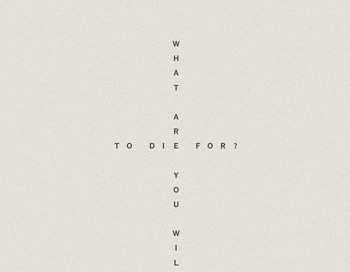Exploring this question will change your life.
If you strip everything away, the things you’d be willing to die for are the things that define what truly matters—what's beyond mere survival or comfort.
A deep truth – Something so fundamental to your being that betraying it would feel like death anyway.
A person or people – Family and close friends.
A principle – Integrity, freedom, wisdom, or the pursuit of understanding.
A way of being – Living in alignment with what you believe, even if it means sacrifice.
When I’m touched by the wonderous glaze of a sunrise or by the magnificent geometry of a simple leaf, the pitiful excuses for my anxious feelings and petty reactions are overcome by the beauty of the unspeakable.
There is something here that I would die for.
It is something that grabs at the heart and the mind, encompassing both of them.
Some might call that God; others may call it Presence, Beauty or Truth. I’ll call it any of those things and rest there.
To answer the question authentically, one must consider how they relate to reality. Being willing to die for something means that something, whether an object or idea, is held sacred.
I have pondered the big questions for a long time. Like many other introspective types, I often obscure reality with abstract ideas and nebulous thinking. This can be both a blessing and a curse.
Introspection is missing in this culture, and much needed. But, excessive introspection can cause clouded bias loops and ruminations.
What often happens is that I separate myself from reality. I ‘go missing’ from the totality of existence because I’m so busy thinking about what it is rather than interacting with it. One must create in the world through participation with it, not merely thinking about it.
This is also a major problem in many so-called therapeutic modalities. You cannot ‘heal’ without fierce exposure to reality. You cannot ‘become whole’ by thinking alone; one must feel everything in its totality and touch life as it is.
"If you have the courage to touch life for the first time, you will never know what hit you.” - UG Krishnamurti
In his seminal work ‘I and Thou’, Martin Buber shares his ideas beautifully:
I–It Relationship: This mode involves interacting with the world and others as objects to be used or experienced. In the I–It relationship, individuals perceive others, including inanimate objects and even people, as separate entities that can be analysed, categorised, or utilised. This approach is characterized by detachment and objectification.
Most people interact here unknowingly.
I–Thou Relationship: In contrast, the I–Thou relationship is a direct, mutual interaction in which individuals engage with others in their entirety without objectification. This mode emphasises genuine dialogue, presence, and a holistic connection that transcends utilitarian purposes. Buber says individuals can encounter the Divine through I–Thou relationships, referring to God as the "Eternal Thou."
"When two people relate to each other authentically and humanly, God is the electricity that surges between them." - Martin Buber
Here rests the wonder of Nature, something I’m willing to die for.
So, how do we choose to interact with existence? That’s up to us and our outlook. I-It or I-Thou?
"All real living is meeting." - Martin Buber
So, what’s your passion?
The word ‘passion’ has etymological roots in the Latin word ‘passio’, meaning:- to suffer. In Old French, the word "passion" specifically referred to the suffering of Christ during the crucifixion.
So, etymologically speaking, one’s passion is what one is willing to suffer for.
Perhaps we ask the wrong questions?…
Instead of searching for ‘passions’ and ‘purpose’ (as we generally understand them), a naive hamster wheel, we should ask - what am I willing to suffer for?
Introspect.
Ask yourself better and deeper questions to get over the superficial plague of society’s drivel.





This reminds me of an important distinction Steve and Pauline Richards from Jung To Live By always make—the difference between harnessing our inherent power of imagination and indulging in its poor surrogate: fantasy.
When I’m in fantasy, I’m in an I-It relationship, treating reality as something to manipulate, dominate, control. Expecting life on my terms.
When life isn’t going the way I think it should, I fall into judgment and victimhood. Stuck, stuck, stuck. I’m saying a big fat NO to life.
And fantasy becomes my only way out.
When I stop negotiating with reality—when I give up the fight, which, in my case, is mostly because I have no fight left—something shifts.
I might not feel better. Trying to feel better is its own tyranny.
I might still be heartbroken, disappointed, uncertain, scared.
But I do stop lying to myself.
In my experience, that’s where most of my suffering lies—not in the pain itself, but in the fight inside.
Lying to myself about the way life is showing up.
In the endless expecting and demanding that things be different than they are.
Wasting life force chasing fantasies.
When I tell myself the truth—however brutal that truth might be—when I say yes to life, exactly as it is, I can finally engage in an I-Thou relationship with reality.
Life on life’s terms, not mine.
And in that moment, something shifts.
It’s impossible to explain. It can only be experienced.
The best word I’d have for it is grace.
Playing the game of life—not as a victim, and not needing to win.
More like alchemy. A space where something new emerges—not through force, but through a dynamic dance of creation.
Fantasy is seeking a way out. And disconnects us from reality. Leads to impotence.
Truth telling and imagination is about discovering a way in. Collaborating with life instead of arguing with it.